My month in Southeast Asia was half professional, half "I've had a genuinely stressful several months and I need to get away and stare at/be in warm clear tropical waters" personal. Both portions of the trip were a bounty of ideas and inspiration for this conservation-focused brain, and I'll briefly share some of those here.
Development and tourism
Every return to Southeast Asia comes with a lot of joy, but also some heartache, much of which stems from observing how rampant development and mindless tourism have continued to steamroll through the region.
The province of Palawan, in the Philippines, is dear to my heart, as I conducted most of my dissertation research there. It's often called "The Last Frontier of the Philippines." It's also regularly featured on those "top islands in the world!" lists, an honor which in some ways has come to feel like a harbinger of doom. I actually do, in many ways, enjoy the modernization of Puerto Princesa, Palawan's capital city (including an updated and now international airport, 2 malls, several hip little coffee shops, 2 new vegan restaurants, and social enterprise-linked storefronts), and I recognize how such modernization likely means a higher standard of living for locals (significantly more important than my temporary comfort during my brief stays there).
At the same time, this pace of development has more obviously troubling implications away from the city. Quiet, undeveloped stretches of coast have, throughout my intermittent visits, been increasingly snatched up (often not by local economic interests) and are now in varying stages of the march toward (over)development for tourism. El Nido, which was already a mess on land when I first visited in 2010, was frankly unbearable to me when I last visited in 2017, and I've more recently witnessed the almost cartoon-like regularity of tourist vans speeding along the highway toward El Nido. And there is the ever-present threat of expanded mining. Now, there are some glimmers, which I'll go more into in a future post; for now, I'll say that at least there are good people and good organizations doing work to protect Palawan.
I witnessed a similar trajectory in progress while on a surf retreat in [undisclosed location] in Indonesia. This was my first retreat, as I've generally been pretty dubious about being immersed with the kinds of people who go on retreats (they turned out to be lovely at this particular one). The main reason I decided to shell out money for this one was that "uncrowded waves" were heavily featured as a selling point. Well, the experience itself was on the whole enjoyable and worthwhile, but the waves were definitely not "uncrowded" for a good portion of the week. Even the retreat organizer was slightly baffled by the noticeable uptick in tourist numbers (and related drama among local surf guides), and in general, I got the sense that seeking surfing paradise in Indonesia has turned into a sort of scrambling race. And this comes, of course, with resorts popping up that heavily feature Jack Johnson music on their restaurant playlist (no hate to Jack, but I'm really not needing to hear his music when I travel to the other side of the Pacific).
And, by one of the actually uncrowded surf spots, there was a limestone quarry in operation. Ancient reefs pulverized to produce cement. I thought back to the limestone hills in Myanmar that, even within my relatively brief time there, were obliterated to feed the high demand for cement by Thai and Singaporean corporations.
Don't worry, I get more cheery here: Raja Ampat. Yes, I am aware that tourism has picked up substantially there. And no, I am admittedly not particularly familiar with the history and ongoing context of conservation in the area (I look forward to reading more). But it was refreshing for my soul to be somewhere that did not feel overrun by tourists (of course, I strategically selected two of the more remote islands for my stay there to avoid being surrounded by other tourists), that did not have a coastline essentially blockaded by barbed wire fencing and "private property" or "lot for sale" signs. It's an incredible place, and even just 6 days of immersion in nature on land and in water was more restorative than any planned retreat (because isn’t that why places like this exist, for the self-care of Global Northers like me?) (please know that I am not serious about that).
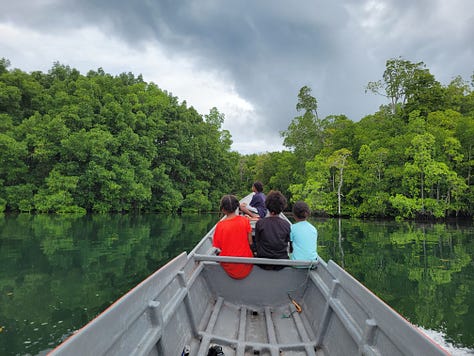
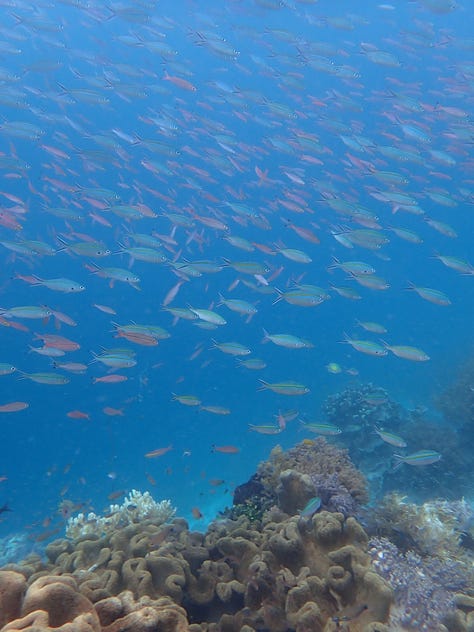
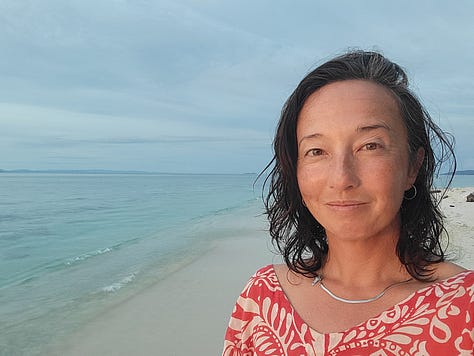
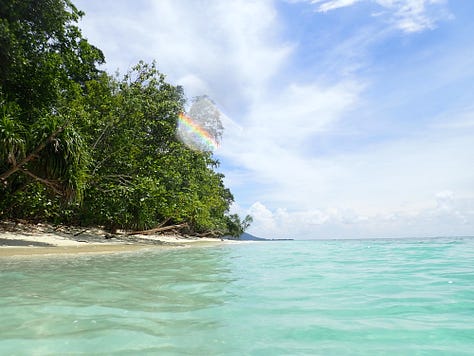
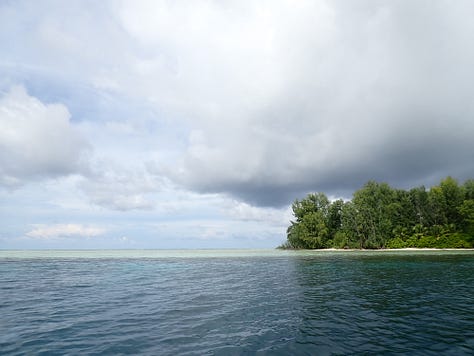
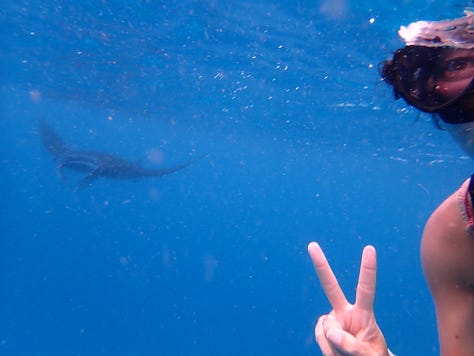
Of course, I was curious to know how local communities viewed conservation and tourism, but my Bahasa Indonesia skills - never particularly extensive, and not in use since 2012 - were profoundly inadequate to have such conversations. If you have more insider knowledge of any of this, please, let's chat! But I enjoyed the experience of staying in homestays and feeling like my money was supporting local families.
Plastics (of course)
All that I wrote above about Raja Ampat is true. That said, during my inter-island transfer, my host frequently had to slow down and navigate patches of plastic debris. In fairness, this was after some heavy rains... however, tourist information sites do often advise that plastic pollution is increasingly an issue in Raja Ampat, particularly around the more accessible islands, and request that tourists pack out any non-biodegradable trash that they create.
Here’s a brief video - it doesn’t do a great job showing the plastic, and this patch was relatively dispersed compared to other ones we went through, but it gives some idea:
The Next Generation
I won't describe too much here, as our funding source prefers that their projects' outcomes are shared in approved press releases (fair enough), but: my time in the Philippines involved a workshop with local university students, and wow. The energy and the openness to transdisciplinary thinking was invigorating and very pleasantly surprising. I have definitely had experiences where people in the biological sciences look a little puzzled when I present the notion that conservation is a human process, but these kids were all in. I mean, there was a lengthy Taglish (Tagalog-English) tirade against the mindless rapacity of capitalism during one of the group presentations! I was not anticipating commentary on the need for structural change from a group of biology students. It even made me - yes, it happens - optimistic.
Some light beach reading
I'm notoriously terrible at choosing light, fun reads appropriate for long flights or beach lounging. I somehow find it stressful to invest any emotions in fictional characters and storylines, but also, reading nonfiction about environmental destruction, systemic injustice, and refugees is definitely also stressful. And yet I do it. Something to explore in therapy, perhaps.
This trip, my terrible beach read was the otherwise fantastic "The Divide: A brief guide to global inequality and its solutions," by Jason Hickel. It was especially thought-provoking to read this book as a Global Norther traveling in the Global South, let alone as a Global Norther who is familiar with (and at times, involved with) international aid and big international NGOs and international conservation processes. But I have much more to say on this, and I will, in an early June “Deep Dive” post.
What do you think?
Do you have any thoughts about what I've shared here? Your own observations of the march of progress - for better and for worse - in places you love? More insight into conservation processes, power dynamics, and social impacts of conservation in Raja Ampat or Palawan? Experiences that inspire you to keep working for conservation, and/or to fundamentally change how you approach conservation? I'd love to hear from you! Comment below or send me a message in whatever way suits you.




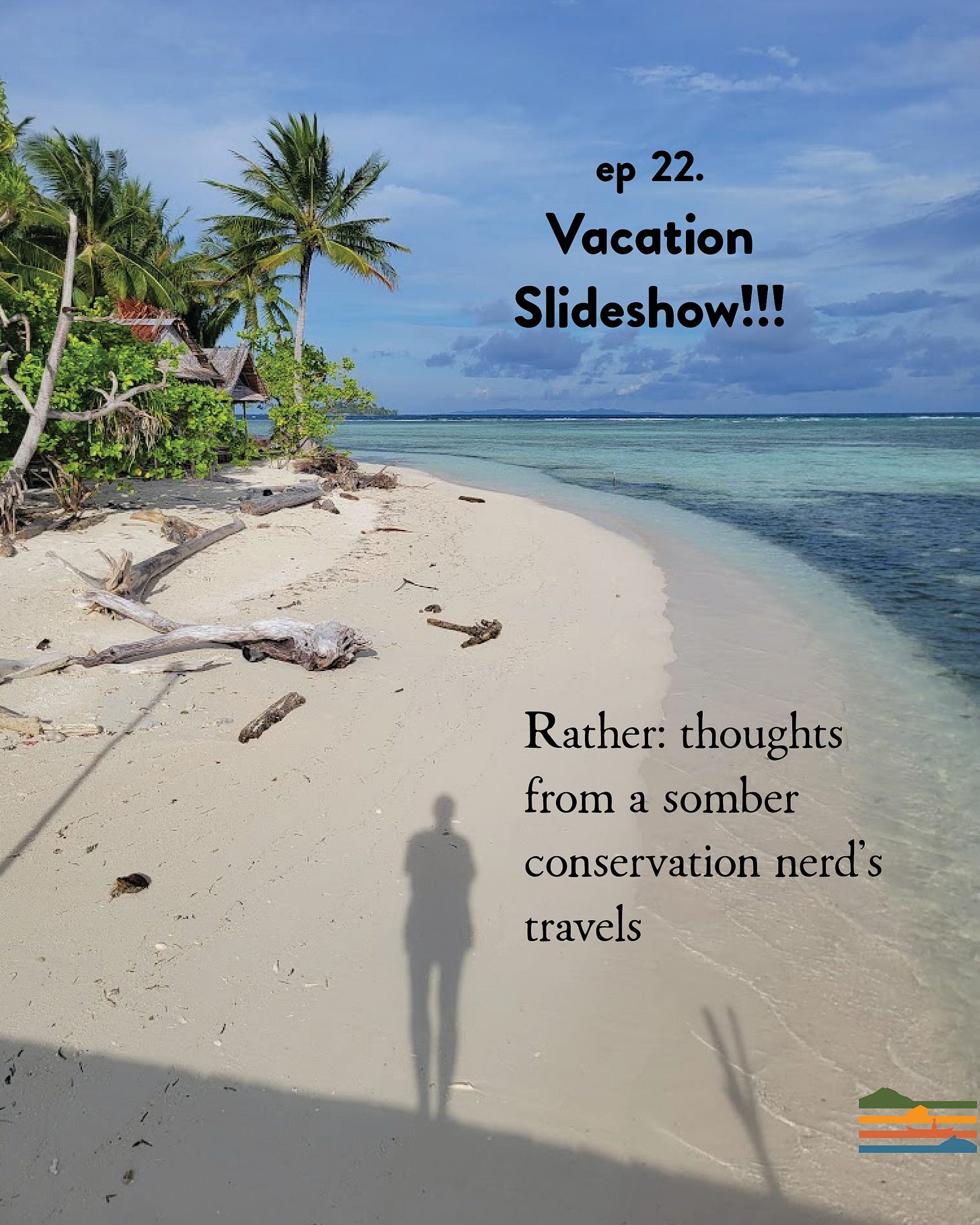

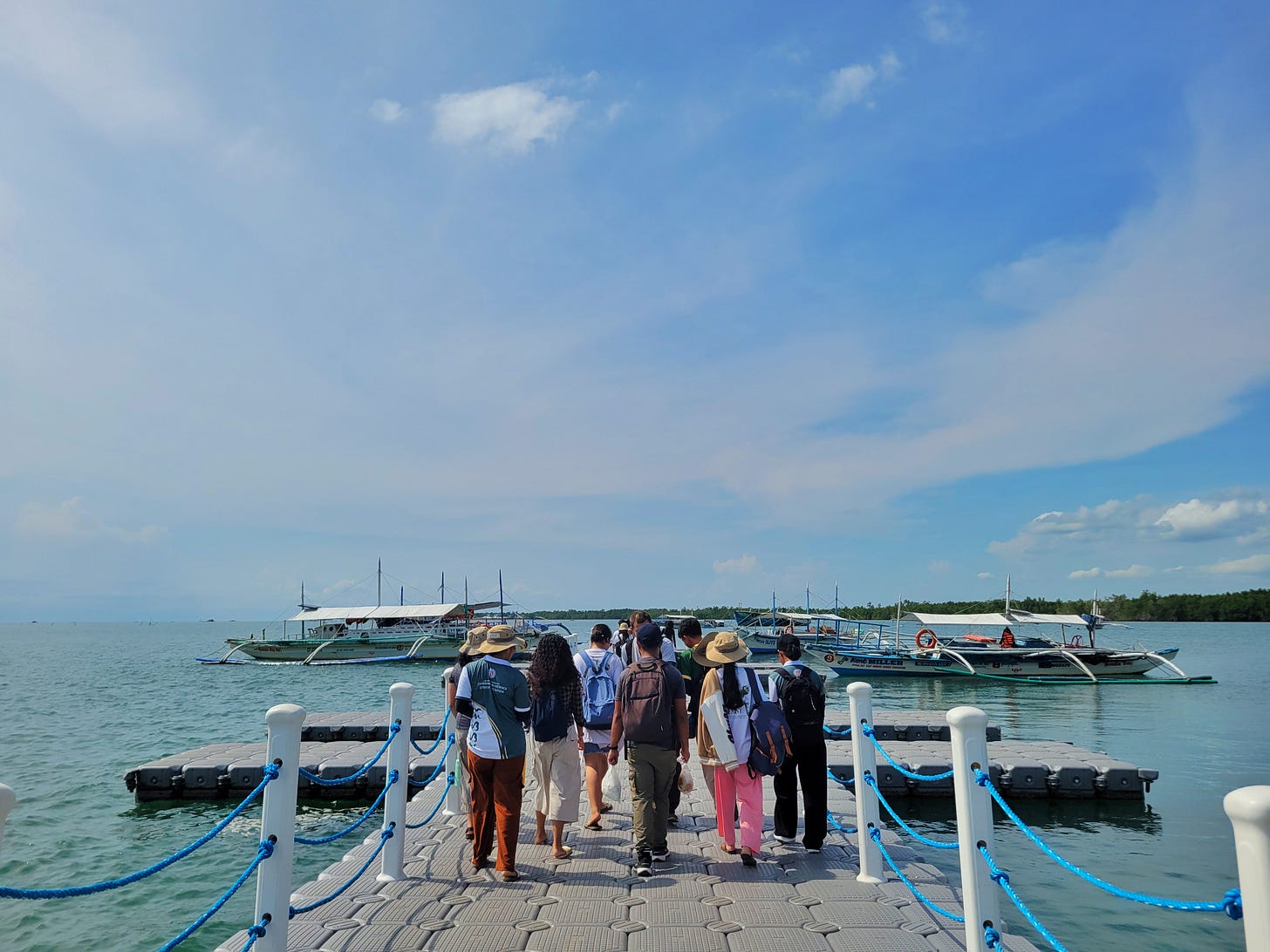
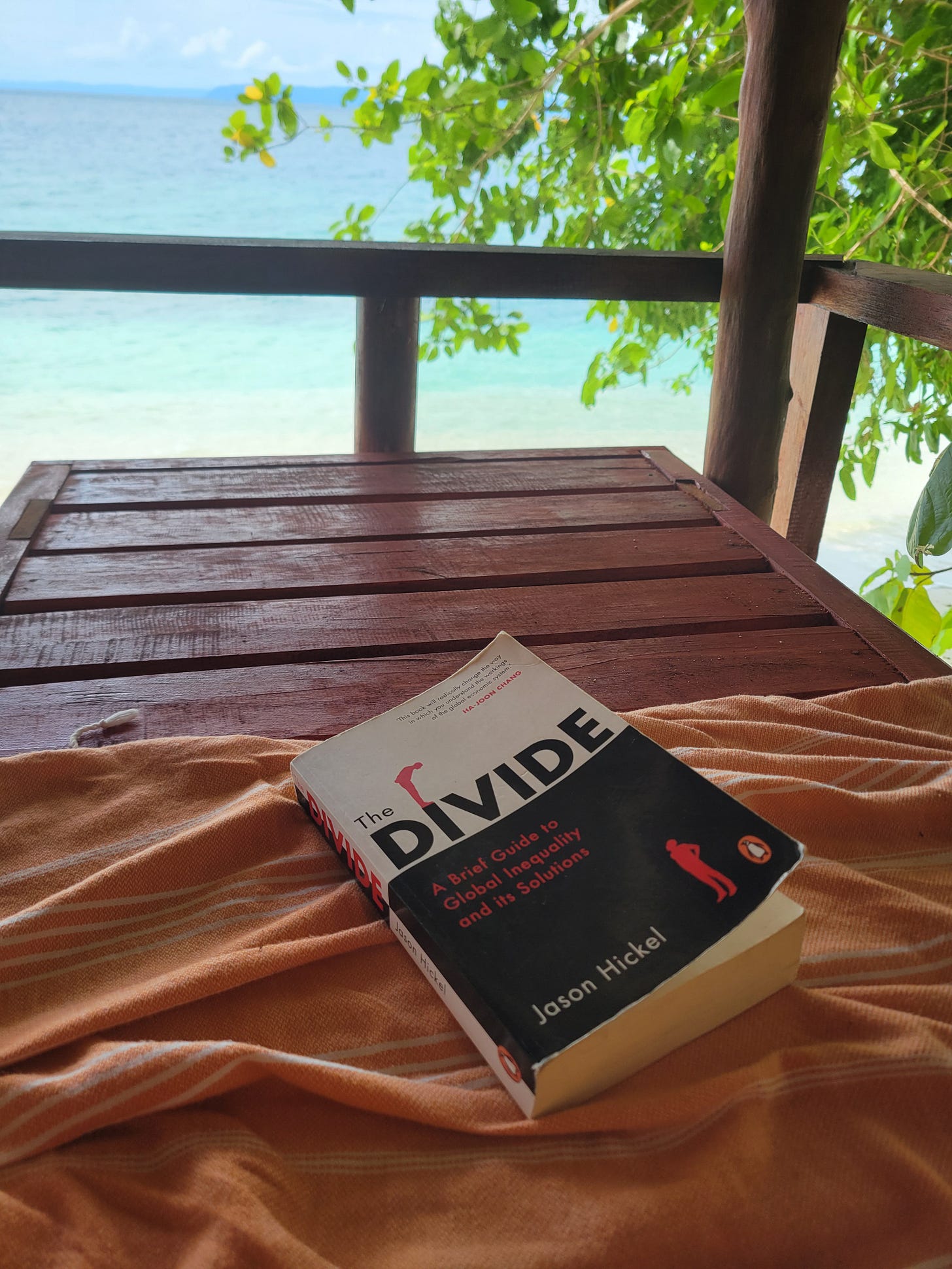

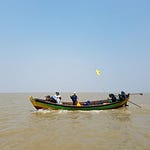




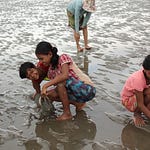


Share this post